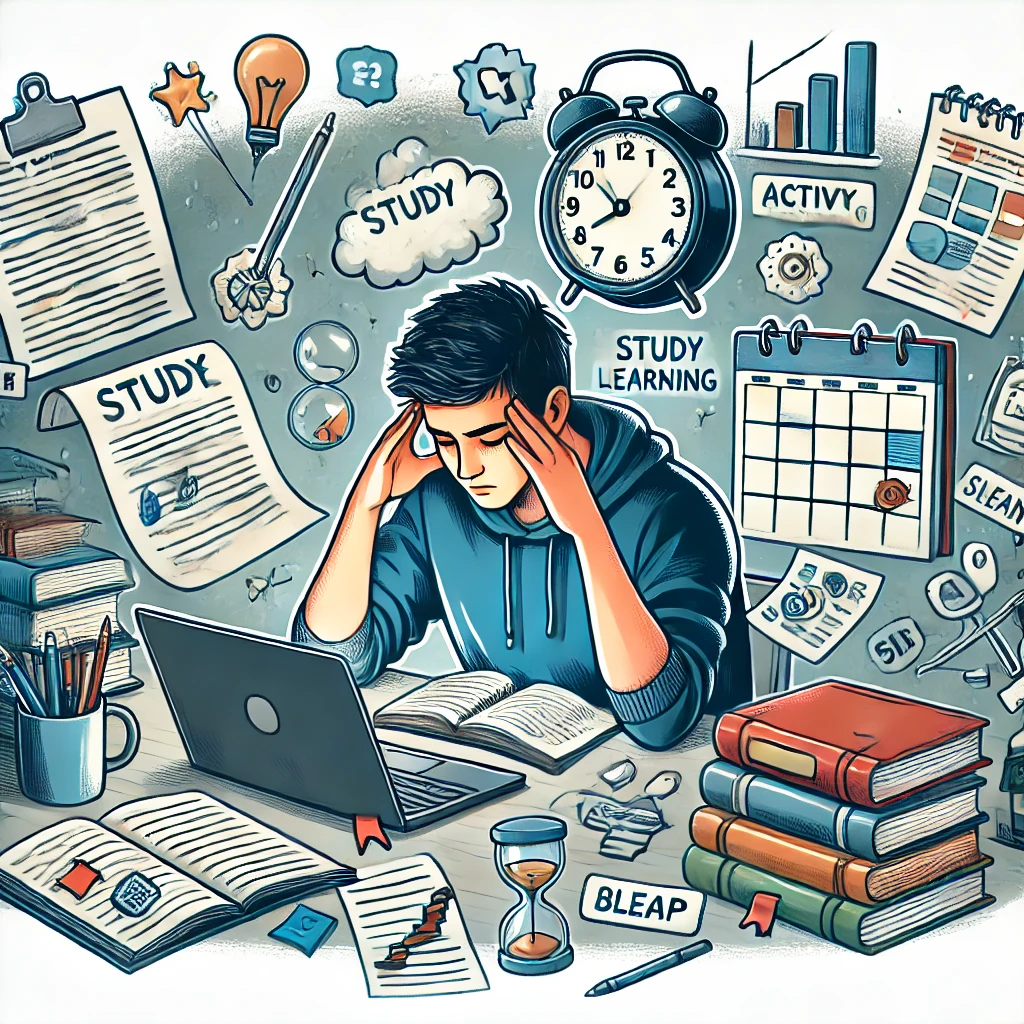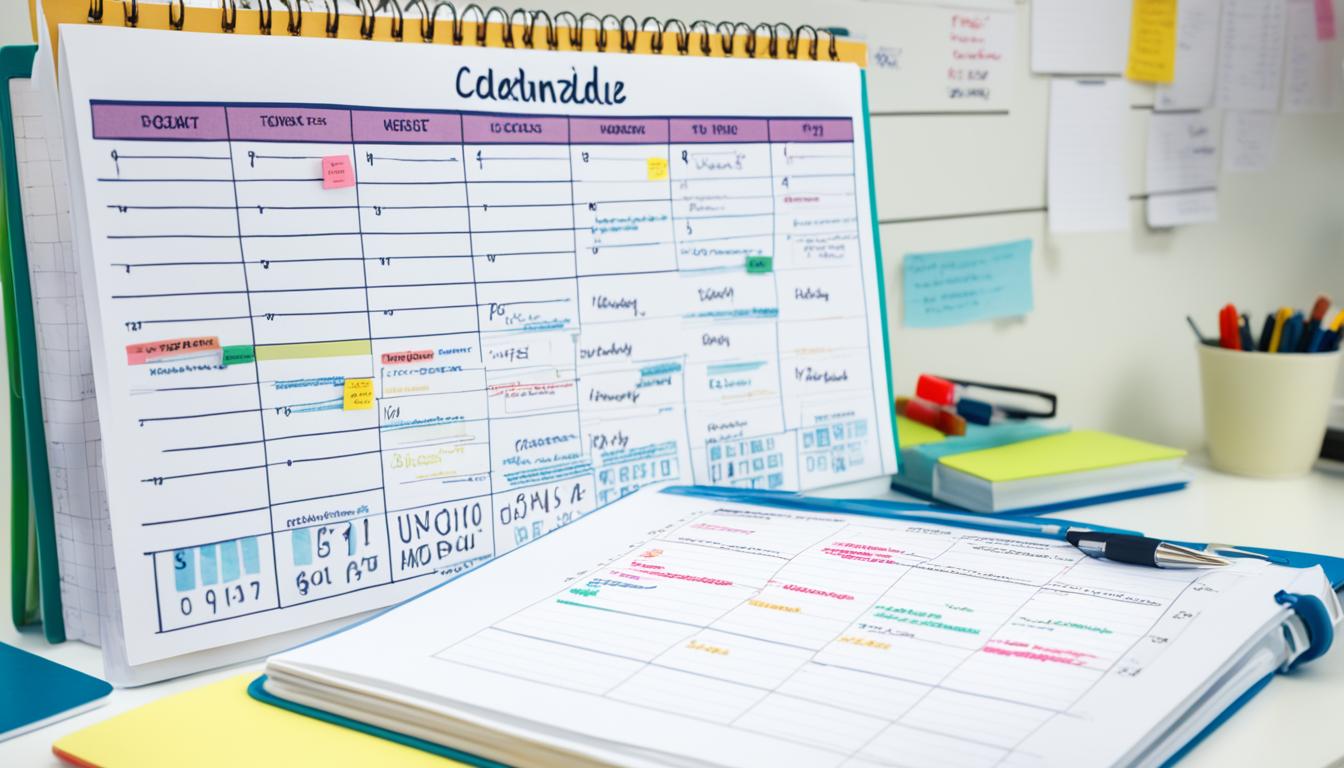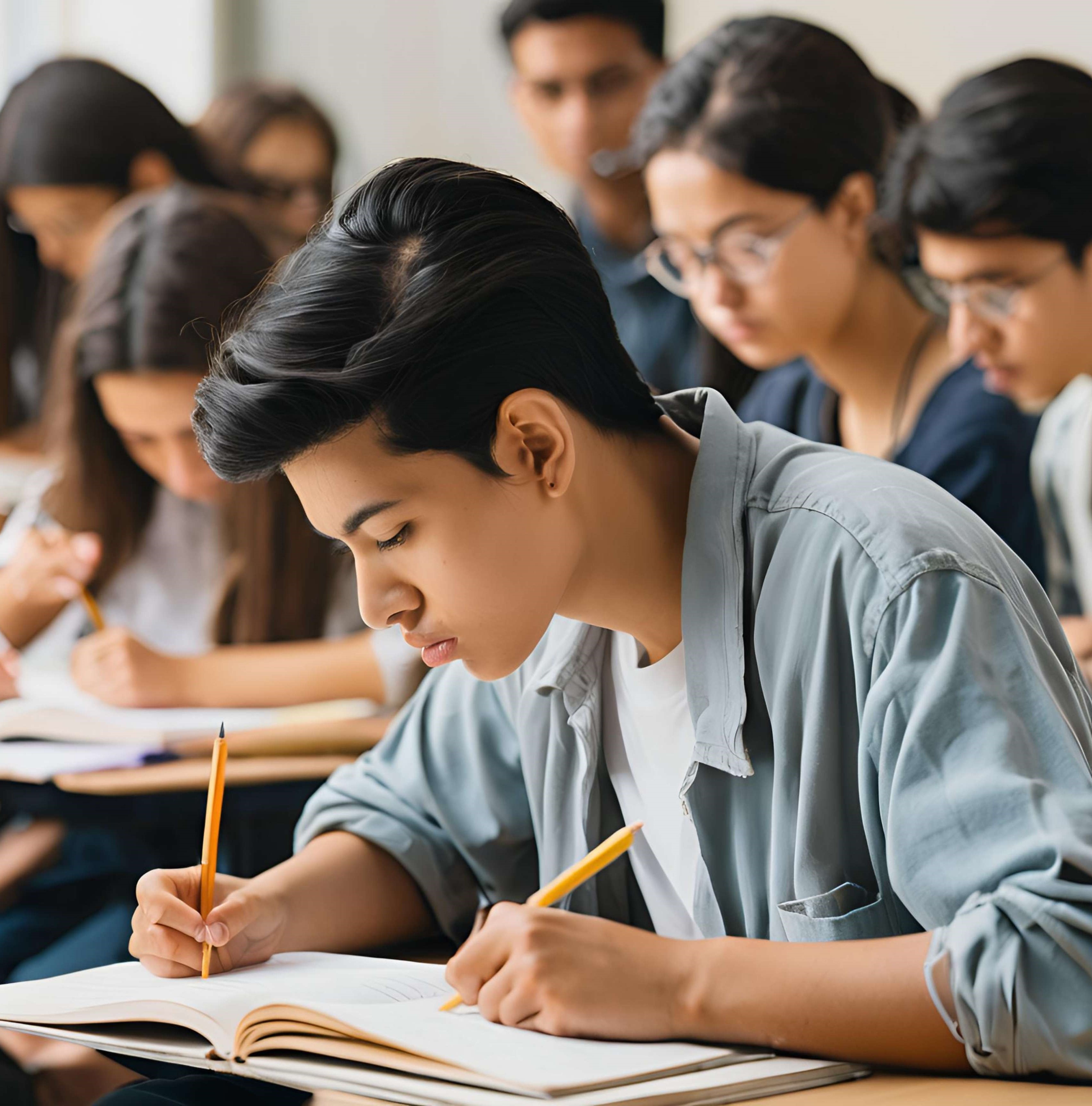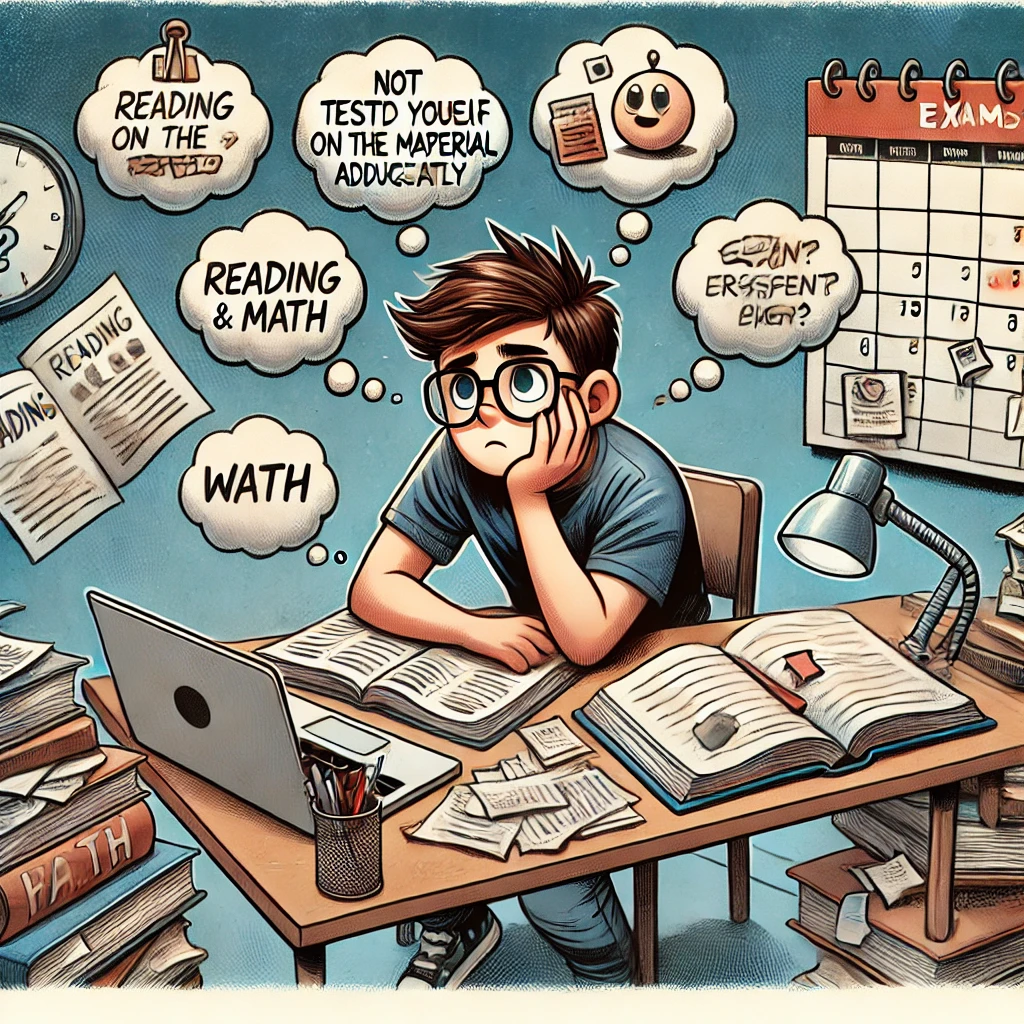Final exams are key for doing well in school. They can make up 25% to 30% of your final grade. But many students have trouble managing their time for studying. This can hurt how they do on exams. To get better, students should stay away from common time management mistakes.
Most students in college don’t know how to study well. This often leads to last-minute studying and just reading notes. But these ways of studying aren’t the best. Studying actively, like practicing hard tests or recalling information, works better. Also, many students don’t start studying for exams early. This causes them to rush through their studies, which doesn’t help much.
Having a good study plan with set goals is key. It helps you prepare for exams in the best way. This also makes you less stressed and more likely to do well. It’s also important to truly understand what you’re learning, not just remember facts. This is crucial for hard classes and for the future.
Don’t forget about taking care of your body when studying for exams. Getting enough sleep and taking breaks helps to lower stress. It also keeps your mind sharp for the exam. Following these tips can help you do your best and feel less anxious about exams.

Not Knowing the Grades You’re Aiming For
It’s important to know the grades you aim for to do well in school. More than 80% of students find their grades slipping at some point. To deal with this, students should set clear goals, learn to manage their time well, and use helpful study methods like memory tricks and active recall.
Importance of Setting Goals
Setting goals helps you know what you need to achieve. Many students don’t know the best ways to study, which can hurt their grades. Knowing your target grades helps plan how you use your time and resources. This way, you can focus on what’s most important for your grades.
Setting effective goals means understanding how different students learn. It also means using time well to study smarter, not harder. This stops you from putting things off and rushing to study at the last minute.
How to Determine Your Target Grades
To set your target grades, consider how much final exams and assignments count. Final exams often make up to 30% of a course’s grade. They’re a big part, so you should focus on them. Knowing what grades you want helps you study the right way.

Organizing your study area and materials can help you work better and do well in school. Going to academic summer schools might also help by giving you more skills and exam practice. If you don’t understand something, ask about it. This can make you understand 15% more.
Practicing good study habits is also key. Going to class and taking part in lessons can help you remember more and do better in exams. Doing tests and mock exams can show how you’re doing and if you’re meeting your goals.
Relying Solely on Teachers for Exam Preparation
Only depending on teachers for exams might not get you ready enough. Teachers are a big help, but students need to study on their own too. A study in 2006 showed that students who tested themselves before big exams could remember 60% of what they studied. This was better than those who just studied without testing, retaining only 40%.
In the U.S., students face about 112 tests from pre-K through grade 12. This many tests show we need to get ready in various ways. An eighth-grade study in 2009 found that students who did practice tests had a 10% better memory of their U.S. history finals. This method outperformed those who only studied traditionally.
It’s also key to mix teacher help with doing your own study. This mix can lower stress during exams by encouraging deep thinking. Practice tests should be like real exams to make students more comfortable and less anxious.
Good teaching should be about learning deeply, not just getting high test scores. Tests show what skills we’ve learned, but self-study boosts our real understanding. Teachers should guide lessons that help students truly master the subject, not just do well on tests.
Starting Study Sessions Too Late
Procrastination can mess up how well students learn. If you wait until the last minute to study, you might forget it all fast. This can make you super stressed and do badly on tests. But, if you start regular study time early, things get better. You can manage your time well and not rush at the end.

Consequences of Cramming
Cramming doesn’t help you understand or remember what you study. It makes you lose sleep too. Many students only get 4-6 hours of sleep a night when they cram for tests. Being tired makes it hard to remember things on test day.
Also, you need to take breaks, eat, and rest. This means your study time is not always very productive. Plus, you only get a shallow idea of the material, not a deep one.
Creating an Effective Study Schedule
To avoid cramming, start studying early. Make a schedule that works for you. Include breaks. Studying a bit every day is better than a lot at once. It helps you remember more and get less stressed.
Also, make sure you get enough sleep. Don’t study all night. A good night’s rest helps your brain work better. With a smart schedule and enough sleep, you’ll do your best.
Studying in Chronological Order Instead of Priority Order
One mistake students often make is studying in order of time, not importance. This can lead to not being ready for harder or more important topics.
With work and other busy things, students find it hard to focus on school work. But, having a good study plan helps use time wisely. It makes sure each subject gets enough attention, based on how tough or relevant it is.
Putting off studying makes things worse. Students can delay because they want to be perfect, or they’re afraid of success or failure. Then, they get more stressed and do worse in school. To fix this, managing time well is key. A solid review of what’s on the exam and making a good plan are important first steps.
A good study plan should make big tasks feel smaller. This helps students not feel overwhelmed. Tricks like Jerry Seinfeld’s “Don’t Break the Chain,” setting fake deadlines, and using calendars and apps can make students more productive.
It’s better to study for short periods with breaks than for a long time without stopping. This way, you remember things better and stay focused. Also, make sure to relax and take care of yourself. This helps your study time be more helpful.

Choosing what to focus on in your studies is key for success. Strategic studying and a good study plan help students feel more confident and do better in school.
Using Passive Study Strategies
Many students like to study passively. This means reading notes, going over textbooks, and listening to lectures. But these methods don’t always help us remember what we learned. They can trick us into thinking we know the material well, until a test shows us otherwise.
Examples of Active Study Techniques
To do better in school, try studying actively. This includes using flashcards, talking about what you’ve learned, and reviewing each other’s work. Anki is a good app for flashcards, and it uses spaced repetition. This is a way to remember things for a long time.
Also, try to test yourself on what you’ve learned. And teach someone else about it. These methods really help you understand and remember better.
Benefits of Active Engagement
Active study has many good sides. It gives you quick feedback, improves how you talk about things, and helps you work well with others. When you study actively, you find out what you don’t know well. Then, you can practice more to get better.
Some study tricks, like breaking up your study time and using real-life examples, make learning more fun. They also help you remember things better. This way, you get a full understanding of what you’re learning.
Failure to Test Yourself on the Material
Not testing yourself enough can really hurt how you do on tests. If you don’t practice enough, you won’t really know what you understand. This makes you think you get it when you might not. You can fix this by using methods that help you remember things better.
Tests have many parts like Reading, Math, and Writing. To do well, you need to practice and find out what you’re good at and what you need to work more on. Bad time management causes a lot of students to score lower. But, practicing a lot can help you manage your time better. It can also show you which questions you should focus on to get a higher score.

Remembering things and getting ready for tests are linked. Taking practice tests is a good way to do this. It makes you pull information from your memory, which makes it stick better. This can make you less stressed about tests. And, you can find the right answers faster, which helps you do better on the test.
Doing practice tests is key for getting ready for exams. It helps you study like you’ll need to on the real test day. This makes sure you’re ready and sure about taking your tests. You can do things like reading faster or better to help study. But, doing a lot of practice tests in a short time can really help you get the scores you want.
Practicing in the Wrong Format
Many students make a common mistake. They use a single study approach without looking at their exam format. It’s key to match your study style with how the exam will be. For example, the GMAT tests your ability to make decisions under pressure. It’s focused on understanding situations, not just correct answers.
On the GMAT, you get more points for answering harder questions right. This means it’s crucial to know when to skip a tough question. It is important to learn unique test-taking strategies for each exam type. These skills can really boost your score.
Practice timing is vital for the GMAT. You have about 1 minute for each problem. It’s smart to aim at getting half to 70% right, skipping the toughest. A wrong answer series can lower your score a lot. And skipping makes your score worse than guessing does.
Adapting your study method to the exam helps a lot. It not only prepares you for the content but also teaches you to use your time wisely. By doing this, you can boost your overall test performance.
Reviewing Only What You Already Know
Studying only what you already know can make you think you’re ready. But it might make you do worse on tests. It’s better to find and work on the things you find hard. This way, your exam prep will be strong all around.

How to Identify Weak Areas
To find your study weak spots, start with self-tests and practice exams. These show where you need more work. Use tools like practice tests and quizzes to focus on what you don’t know. This method will improve your knowledge step by step.
Strategies for Strengthening Weak Areas
After finding what you struggle with, focus on those areas. Study tough topics first to give them more time. Active learning helps a lot. This includes making summaries and teaching what you learn to others. Keep testing yourself and reviewing the hard parts. This ensures you really understand them well.
Memorizing Without Understanding
Memorizing without understanding often disappoints students. This is especially true with tough, conceptual exam questions. Jason Batterson, from the Beast Academy, talks about the challenge. He says it’s hard to keep info in your head if you don’t understand it. This points out the battle between really getting something and just memorizing it.

Eric Jensen focuses on how memory matters in school. But, too much stress can mess up our ability to remember stuff. He says we should teach how to remember things well. These “Learn to Learn Skills” can boost how well you do in school.
We do need to remember some things, like times tables, to get math better. But really knowing and using what you’ve learned comes from thinking deeply. This helps students see how info fits in lots of situations.
The school year beginning on August 1st, with both in-person and online learning, makes good learning strategies key. Mixing memorizing with bigger learning goals is crucial during this time. Studies show that just memorizing facts doesn’t stick well. Learning with a goal helps you really understand things.
Imagine a trigonometry class where the sine of π/2 is “one.” But if the students don’t get why it’s “one,” they’re missing the point. This shows why it’s not enough to just memorize things. Teachers should help students truly understand. This way, they can tackle tough problems in any area.
Conclusion
Learning to manage time is key for test success. This piece looked at traps like waiting too long, counting too much on teachers, and poor prep. Good time skills make studying better, lower stress, and help you get the lessons well.
It’s very important to put the important work first and plan your study time. Bad time skills can hurt how you do in school and lead to lots of worry. Almost all workers say they wait too long sometimes. Learning to manage time helps adults and people who start their own businesses do more and keep up with deadlines.
Avoiding these problems and using tricks like the Pomodoro Technique helps students do better. These methods not only get you ready for tests but also teach skills you need for life. Let’s grab these tips for test success to learn a good way to handle exams and time.
FAQ
What are some common exam time management issues that students should avoid?
Not setting academic goals is a big issue. So is relying only on teachers for prep. It’s also bad to start studying late. And only focusing on the easy stuff without finding your weak points is a mistake.
Why is it important to set academic goals for exams?
Setting goals shows how important each test is for your grade. It helps students know where to put their study time. By understanding which tests matter most, they can aim for specific scores.
How can students determine their target grades?
To figure out target grades, look at your current course standing. Also, know how important the final exam is. Then, set goals that are realistic and will help you reach your desired grade. Talking to teachers and using grade tracking tools can also help you set goals.
What are the consequences of relying solely on teachers for exam preparation?
Relying only on teachers can leave gaps in your understanding. Teachers are helpful, but independent study is a must. Use effective studying techniques to really know the material.
What are the pitfalls of starting study sessions too late?
Starting late often means cramming, which is stressful. It can also make it hard to remember the information. Starting early and studying consistently helps you learn the material better over time.
How can students create an effective study schedule?
Start your revision early and divide the material into smaller parts. Set aside specific times for each section. Stick to your schedule. Also, include breaks and various study activities to stay productive.
Why should students avoid studying in chronological order?
Studying from start to finish might not be the best way. Recent or harder topics are often more important. Prioritize your study time based on what’s crucial for the exam.
What are some examples of active study techniques?
Active techniques are like testing yourself and teaching others. Also, use flashcards, summarize notes in your own words, and discuss in groups. These methods keep you engaged and help you remember better.
What are the benefits of active engagement in study?
Being active helps you remember the material longer. It deepens your understanding and boosts your critical thinking. Plus, you’ll find it easier to remember during the test.
How does practice testing enhance exam preparation?
Practicing tests helps you remember the facts better. It shows where you’re strong or weak, which is vital. Also, it helps make sure you really know the material for the test.
Why is it important to match study styles to the exam format?
Different exams need different study strategies. For example, multiple-choice tests require quick recognition. Essays need deep understanding and clear writing. Adapting your study method to the test format is key for good prep.
How can students identify their weak areas in study material?
Self-testing and reviewing past tests are good ways to find weak points. Talking to teachers for feedback can also help. Focus on the topics that are confusing to you.
What strategies can help students strengthen their weak areas?
Focus on the tough topics in your study time. Use active techniques like testing yourself. Ask for help from teachers or friends. Keep practicing the hard material to get better at it.
Why is understanding material more beneficial than rote memorization?
Knowing the material deeply is better for using it in different situations. Rote memorization can fail you in tough exam questions. Critical thinking and really understanding the concepts lead to better exam scores.

More Posts
5 Best Online Calendar Planners (Free & Paid)
Focusing and keeping up with schedules can take time and effort. It can also be overwhelming when tasks and deadlines are late. Every employee wants to enhance their performance and productivity; this is...
11 Effective Ways to Overcome Financial Procrastination
Half of the world struggles with procrastination, which affects money matters a lot. Putting off financial tasks can make you stressed, unhealthy, and lower your self-esteem. Knowing why you procrastinate and using good...
9 SMART Time Management Goals You Should Consider
Time management tricks make it easier to get more done today. SMART goals—Specific, Measurable, Attainable, Relevant, Time-bound—turn wishes into real plans. They give you clear steps and can make daily tasks and work...
7 Best Daily Habits for Success to adopt
In our bustling lives, we often overlook the quiet and unassuming power of best daily habits. Like cogs in a grand clockwork, they subtly keep the engine of our lives humming smoothly. We...